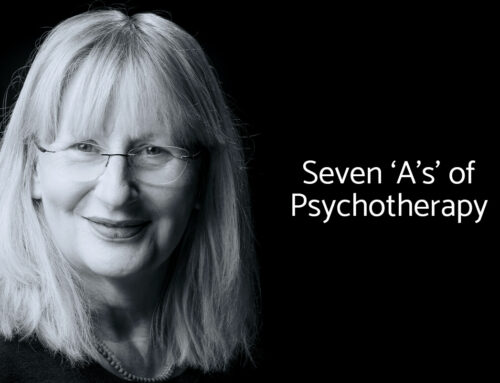My psychotherapist doesn’t say much – what is he or she thinking?
What does my counsellor or psychotherapist think about me, and why don’t they tell me?

At the beginning of our work together, and at the beginning of each session, a counsellor or psychotherapist will often deliberately avoid thinking too much, and you may also find that we say very little. This is because we want to be as neutral as possible, and we do not want to draw conclusions about you too quickly. We want to hold on to the huge advantage of not knowing you yet, while our perceptions are fresh.
There is a maxim that a psychotherapist should commence every session without memory, thought or desire – which is an attempt to be present with the unknown, and to allow the work of the unconscious. We want to have the experience of being in the room with you, listening both to what you say and how you say it, and noticing the feelings, the state of mind and the self-concepts that lie underneath. The way we listen is through free floating attention, being present and open, and in this way we can discern some of what is just under the surface. We observe very carefully any impact or impression that being in the room with you has on us. However, this observation is compassionate and is not intended to make you feel you are under scrutiny. We deliberately cultivate a state of “not knowing”, and we focus more on the process of the sessions than on the detailed content that is discussed. This way of working might, perhaps, appear vague or odd to those trained in professions such as medicine, where the unconscious of the patient is not consulted, and a diagnosis must be arrived at swiftly as soon as the necessary observations have been carried out, followed by a treatment plan. (Of course we do in fact provide this when it is needed!)
We all make observations of other people very day, usually without thinking about it much, but a psychotherapist pays particular attention. Our first few meetings together have qualities like a hologram, in that everything is already present, and all of the future themes of the work can already be discerned if the therapist is centred, open and observant enough to read the field. Being present in a mindful way can be more helpful than thinking in this situation.

So although the therapist may be sitting there quietly, we are working hard under the surface to be present and to observe many different potential patterns. For example, we may be notice your attachment style, or the particular way you relate to us. At the same time, we wish to be welcoming, and to help you to feel at ease so that you feel sufficient trust and relaxation to open up and share all that you need to. So sometimes we also have to put into words, as fast as possible, some of what we are feeling and experiencing, in order that you can feel met, recognised and responded to. A client has occasionally asked me if I feel bored, but with all of this going on it is more likely that I am trying to concentrate on making sense of a lot of information at once.
A psychotherapist is a careful and observant listener. We are not in this field of work in order to make judgements or even form a professional opinion about you – this is not our motivation for being here. Often we are quite reluctant to offer a diagnosis. We are equipped to do this, but often feel that this doesn’t help much, as psychiatric terms are limited to mental ill health. Psychotherapists have a particular interest in applied, positive psychology, such as models of how people learn and change and attain personal, professional and spiritual growth, and psychodynamics. We tend to be passionate about these interests, and have made a lifetime’s study of the processes of interpersonal relationships, growth and transformation, and we invest a great deal in our training. Therapists frequently say it is a privilege and an honour to be with our clients.
The satisfaction we therapists get from our work is real, and it arises partly from seeing you resolve the issues that brought you, seeing you discover unexpected improvements, or realising that once you have been successful in applying new insights and skills in one area of your life, you can take this much further.
Therapists learn from clients, and everyone is unique. Allowing you to show us what you really need, and all that you have been through, is all-important as there is no universal therapeutic approach that works for everyone.
We tend to bring thinking in after and between the sessions, as we drill down deeper into what we learned and experienced, and how this could inform how we work with you in future. Then we might reflect upon theory and current psychological thinking and how it might apply. In particular we try to explore our own countertransference, which is the subtle way we feel different with you than with anyone else. We reflect upon the impact on you of the things we said in a session, and then create a focus for the work for the next session – but we deliberately put this to the back of our mind and “forget” it when we meet with you.
When we think about you, we keep uppermost in our minds something that may surprise you. Different schools have different names for your essential, real, unconditioned self, the part of you that holds all your incredible potential and strength, and that is always there no matter what. It’s like you were when you were a child, full of wonder and vitality, before the world got in and made things complicated. This is the part of you that we always attempting to elicit and bring to the foreground, and this is who we think you really are.




